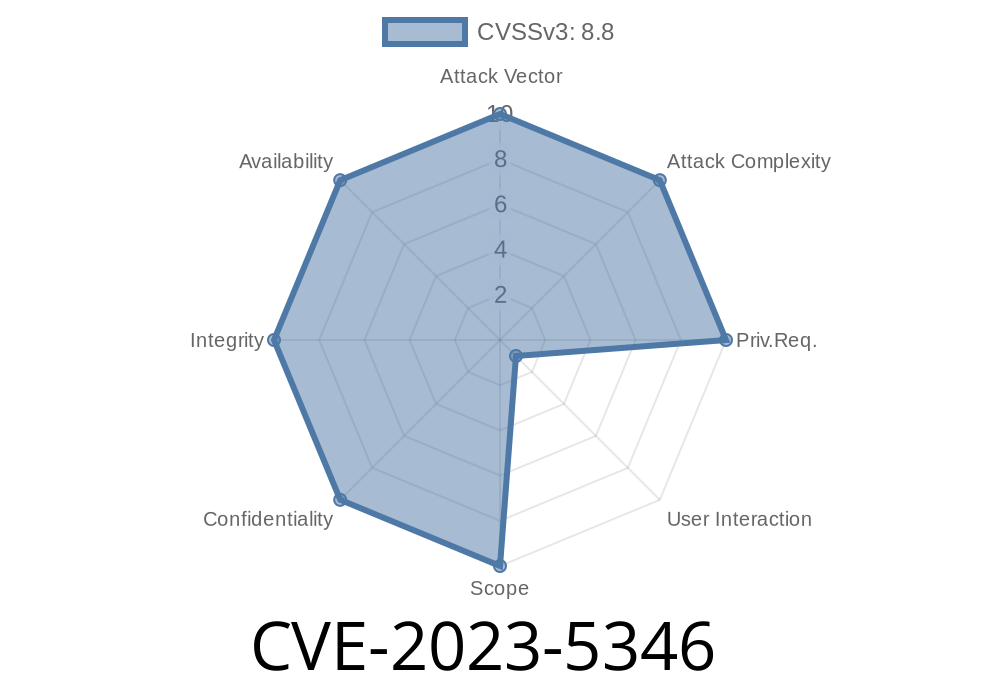In September 2023, Google patched a serious vulnerability in the V8 JavaScript engine used by Google Chrome. Known as CVE-2023-5346, this bug had a _high_ security severity and allowed remote attackers the potential to corrupt a browser’s memory and even run malicious code, just by tricking a victim into visiting a malicious website.
In this article, you’ll find a plain-English breakdown of CVE-2023-5346, how the bug worked, and a simplified proof-of-concept illustrating the risk—not for misuse, but for awareness and education.
What is V8 and Why Do Bugs Matter So Much?
V8 is the JavaScript engine written by Google and used in Chrome (and other browsers/projects). It takes your JavaScript code and makes it run blazing fast. But V8 is written in C++, and with that speed sometimes comes risk. If there’s a bug in how V8 handles JavaScript objects, an attacker could trick it into accessing memory incorrectly—leading to “type confusion” and memory corruption.
What is "Type Confusion"?
In programming, objects have different types (think: arrays, images, strings). If a bug allows a script to "confuse" the engine and treat an object of one type as if it’s another, that's a _type confusion_. If this happens, the engine could read or write memory wrongly, leading to heap corruption—sometimes opening the door to remote code execution.
What’s Special About CVE-2023-5346?
- Impact: Before version 117..5938.149, Chrome could be attacked via just a web page. The bug lies in how V8 processes certain JavaScript objects.
- Severity: High — means exploitation could let an attacker bypass security and possibly run their own code on your computer.
- Fixed: Patched by Google in September 2023. Release notes.
Original Reference
- Official Chrome Security Advisory: Chromium Issue 1470041
- CVE record from NIST NVD
Exploiting the Bug: The Basics
The vulnerability happened due to type confusion in certain V8 JavaScript built-ins, such as Array or TypedArray methods. By playing with the internals (for instance, pushing and popping elements in a wrong order, or abusing inlined functions), attackers could break out of the type system.
In the worst case, this gives _arbitrary read/write access_ to the JavaScript heap. With enough control, skilled attackers could leverage this to run code outside the browser sandbox.
Example Code Snippet: How Type Confusion Might Be Triggered
Below is a highly simplified proof-of-concept. This is not the actual Chrome bug, but shows the idea of creating a confusion between an object and an array, something at the heart of CVE-2023-5346. (The real exploit would be more complex and specific.)
// Simulated bug: type confusion in a JavaScript array method
function confuseTypes(obj) {
// Imagine this function triggers type confusion internally in V8
let o = [1.1, 2.2, 3.3]; // A Float array
// Some crafted HTML/JS could mess with V8's type understanding here:
o[] = {};
// Now the engine sees an object but treats it as float
// Try to access property, might lead to corruption in real bug
console.log(o[]);
}
confuseTypes({});
NOTE:
This example won't crash your browser, but in V8's C++ code, mixing types like this could cause the engine to mismanage memory, allow out-of-bounds reads or writes, and in rare cases, lead to code execution.
Public Exploits & Demonstrations
As of writing, there is no official public exploit for CVE-2023-5346, but researchers have demonstrated similar attacks against previous V8 bugs (example: this blog post on V8 exploitation). Attackers usually:
Final Thoughts
Type confusion bugs in V8 are highly sought after by attackers. CVE-2023-5346 is a reminder that web browsers, despite constant security work, are complex and at risk. Google’s fast response and patch distribution helped keep users safe—just be sure you’re up to date.
Further Reading
- Chrome Blog: Security Updates
- Project Zero: V8 Exploitation Write-Ups
- Chromium Issue Tracker: 1470041 (CVE-2023-5346)
Stay safe, keep your browsers updated, and always be curious about how things work behind the scenes!
Timeline
Published on: 10/05/2023 18:15:00 UTC
Last modified on: 10/07/2023 03:18:00 UTC
